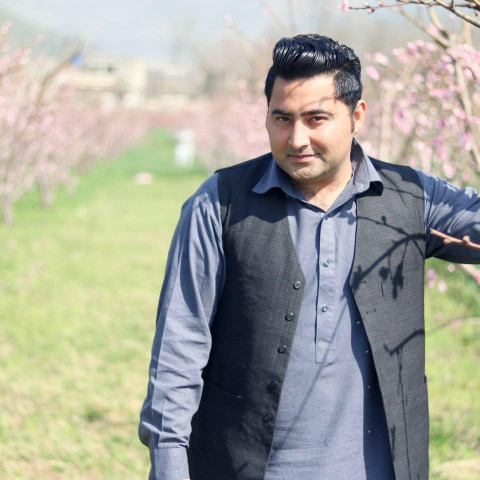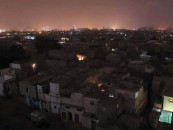Mardan Lynching: JIT says Mashal’s murder was premeditated
Investigation body says no blasphemy accusations against Mashal and his friends have been proven to be true

Journalism student Mashal Khan was shot and brutally lynched on campus on April 13. PHOTO: FACEBOOK
Mashal, a student of AWKU’s Journalism and Mass Communications Department, was shot and beaten to death at the university’s boys hostel by an angry mob that accused him of posting sacrilegious remarks on social media.
The Supreme Court of Pakistan had taken suo motu notice of the brutal murder that shocked the entire nation. A 13-member JIT was also formed to probe the tragedy. Dozens of people including students, AWKU employees and local political leaders were rounded up after the killing.
The 308-page report, available with The Express Tribune, comprises 8 pages of the JIT’s conclusion and recommendations and 300-page police record, replete with confessions, stories of corruption and happenings that led to Mashal’s killing.
AWKU administration, police behind Mashal Khan’s killing, claims father
According to the report, Ajmal Mayar – president of the AWKU employees’ union – told the JIT that a month before the murder, Sabir Mayar, head of the Pakhtun Students Federation, and Asad Katlang, an AWKU employee, had come to his office and told him that they “have to get rid of Mashal [as] he is a threat to the party.”
However, the report says it is unclear what tactics Sabir and Katlang employed to ‘get rid of Mashal’. Both the accused are among the people who are absconding since the incident.
Mashal’s interview with Khyber TV, a local Pashto Channel, in which he criticised the university administration and the government for not appointing a vice chancellor has also been referred to in the report. Mashal’s father Iqbal Khan told the JIT that this criticism led to a conspiracy against his son.
The JIT report, which will be submitted to the Supreme Court and the Anti-Terrorism Court, also calls into question the role of the AWKU administration and Mardan police. It recommends that severe punishment be granted to all employees and students involved in the case.
Mashal’s father demands arrest of facilitators
It suggests strict departmental action be taken against Registrar Sher Alam, Director Administration Peer Asfandyar, Chief Security Officer Inayatullah Afridi, Provost Fayaz Ali Shah, Chief Proctor Professor Idrees, Director Sports Professor Farooq and Assistant Registrar Humyaun for their incompetence.
What happened on April 13?
Recapitulating the events that unfolded on 13.4.2017, the JIT report says around 13 students gathered in the lawn on that particular morning and planned what to do.
They first called Abdullah, a friend of Mashal, into a classroom on the pretext of preparing a presentation but accused him of blasphemy when he arrived.
Two lecturers – Sana Gul and Ziaullah Hamdard – tried to deal with the situation during which the Chief Proctor Professor Idrees and Professor Farooq arrived. While they joined the discussion, one of the professors managed to rescue Abdullah and hid him away in the washroom of the Chairman’s office.
'Imam refused to lead Mashal Khan's last rites'
It was decided that a committee would be constituted to probe into the matter. The students also asked for inclusion of Ulema in the committee.
While the matter was about to be settled, Bilal Baksh, who was appointed in the university as a key punch operator but later elevated as security officer at the main gate came into the administration section without any valid reason and shouted that anyone aiding and abetting a blasphemer should also be killed. He reportedly said this while pointing at lecturer Ziaullah Hamdard.
The report notes that this was the first attempt to enrage the mob and incite it to violence that later led to the tragedy. It also notes that lecturers and professor present on the occasion wasted valuable time and tried to suppress the matter rather than informing the police
The chief security officer who reached the administration block did not inform the police about the magnitude of the situation and the DSP Sheikh Maltoon arrived in civvies along with just two policemen.
Mashal Khan murder: K-P completes inquiry over police role
Professor Farooq told the DSP about the alleged blasphemy and said he had himself spoken to Mashal and Zubair, both of whom, he told the officer, were not on the campus.
While the DSP tried to figure out the situation, the mob grew violent and started smashing windows of the building. Abdullah, who was in the washroom, was dragged out by the mob and beaten. The DSP, however, managed to save him only by getting injured himself.
The situation further aggravated when Assistant Registrar Humayun issued a notification from his cell phone and rusticated all three students Mashal, Abdullah and Zubair on charges of blasphemy.
The report notes that the assistant registrar was acting on behalf of the registrar who was absent without any prior notice. It says the notification was issued without any investigation.
Ziaullah Hamdard who had taken refuge in a hostel, was attacked by a mob who snatched his phone which had a message in which Mashal had told him that he was hiding in room No 105.
Lecturer among three more arrested in Mashal Khan lynching case
The mob entered the room by breaking down the door and started beating him with sticks. Mashal tried to run down the stairs but was shot by one Imran Ali. Hearing the gunshot students from the rest of the rooms came out.
Three people, including the warden of the hostel and a boy who performed the duties of the Imam, ran towards Mashal and picked him up. According to the report, Mashal recited the Kalma and told the Imam that he was a Muslim. He requested him to take him to a hospital. However, Arif Mardanvi, a counselor arrived at the scene along with a lecturer and other people and started beating Mashal.
The DSP who had heard the gunshot ran towards the hostel to save Mashal but had already died by that time. However, the official managed to stop the mob from setting fire to his body with the help of additional policemen who arrived with the SSP Operations.
Of the 60 people, identified from video footage and other information verified by the Federal Investigation Agency (FIA) and the Pakistan Forensic Science Agency (PFSA), 57 have been arrested, while three accused are still absconding. Eight accused have confessed to their crime.
ANP workers disrupt Mashal’s chehlum after jirga leader criticises party
“From the investigations carried out as of yet, none of the charges of blasphemy levelled against Mashal, Abdullah and Zubair have been proved,” says the report.
Other findings
During Investigation, the JIT also learnt about immoral activities in the university hostel, which included sales of drugs, presence of weapons and even exploitation of female students with the help of the former vice chancellor (VC) Ehsan Ali.
The former VC had given unauthorised power to some officials including the former provost Abrar, who was a commercial assistant in Wapda and got the job despite not being eligible. He was responsible for providing a safe haven to armed men in the hostel.
The JIT notes that people with criminal record had also been employed in the university based on political affiliations and suggests that the record of all employees be checked.
The role of the police has also come under question. The JIT has criticised police’s inability to use the riot police in time. It says the junior officers also did not help senior officers during the situation.
After Mashal’s lynching: AWKU’s Mardan campus reopens after 42 days
The JIT recommends a separate, high level inquiry by the police department.
The JIT holds Chief Security Officer Inayatullah Afridi the most responsible as it was his basic duty to coordinate with those who provide security.



















COMMENTS
Comments are moderated and generally will be posted if they are on-topic and not abusive.
For more information, please see our Comments FAQ